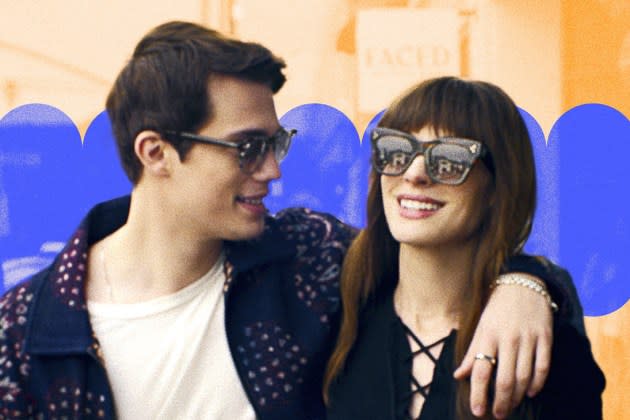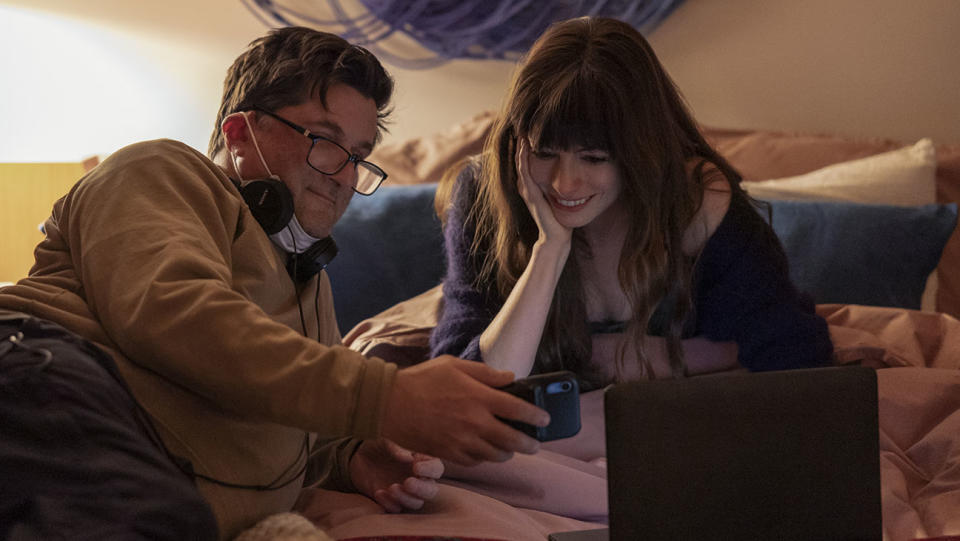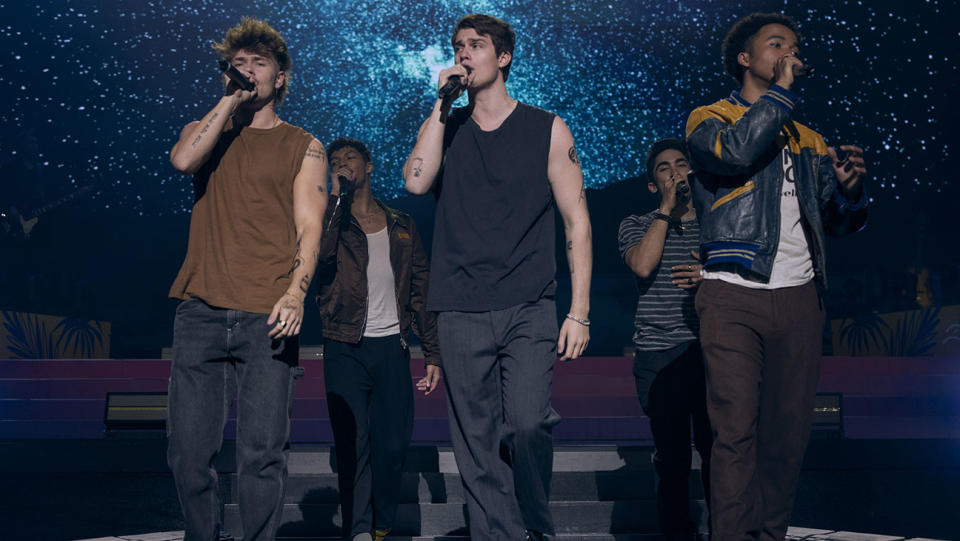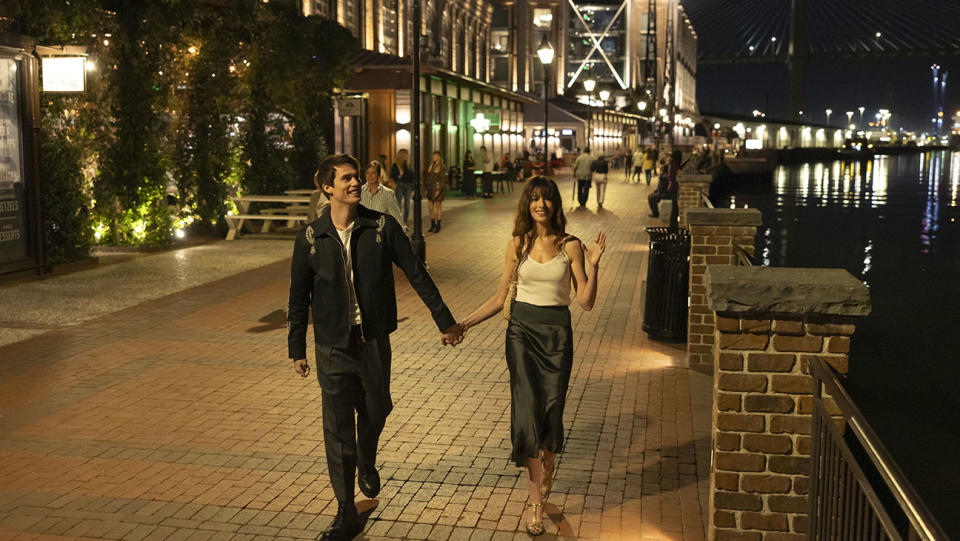Why ‘The Idea of You’ Strays From Book’s Ending
- Oops!Something went wrong.Please try again later.

[This story contains spoilers to the The Idea of You film on Prime Video.]
The Idea of You starts like any other romance movie: A boy and girl meet, fall in love, and maybe have a swoon-worthy ending. But what happens when the girl is a 40-year-old woman, the boy is a 24-year-old boy band member, and fame and public scrutiny bring obstacles to the journey that might’ve been leading to a happy ending?
More from The Hollywood Reporter
Events of the Week: 'The Fall Guy,' 'The Idea of You' and More
Nicholas Galitzine on "Setting Boundaries" and Not Engaging With the "Toxic Parts of Hollywood"
The Idea of You centers on 40-year-old art gallery owner Solène Marchand (Anne Hathaway) who, after being forced to take her daughter and friends to Coachella after her ex-husband bails on the plans, unexpectedly meets Hayes Campbell (Nicholas Galitzine), British front man to the uber-popular boy band August Moon. Despite Solène being unfazed by the pandemonium and allure of the young singers, their meet-cute eventually turns into a steamy romance, but not without the hiccups of fame and attention that come as a result.
Though the film, adapted from Robinne Lee’s 2017 novel of the same name, offers a Notting Hill-esque tale, the film version aims for more sexiness and enhanced rom-com energy while incorporating the “tension and sophistication” of the forbidden romance, says director Michael Showalter.
“If there was a version of the movie maybe that was more true to the book, that would have been great, but I probably wouldn’t have been the right person for[it],” Showalter tells The Hollywood Reporter adding that he joined the project with a “specific kind of vision” and “a certain kind of tone” bringing humor along with the nuance.
The story of Hathaway’s Solene is the heart of the film, which ultimately aims to celebrate women embracing their happiness and sexual freedom regardless of age, offering a poignant exploration of how society traditionally writes women off as desirable as they get older. “It was important to me that she not be a damsel in distress and that she not be dormant sexually and is being woken up sexually. She is already sexual. She just makes the choice to be sexual with Hayes.”
As for Hayes, Showalter explains, “He’s a sex symbol, he’s wealthy, he has all these things, but I believe [he] is genuinely conflicted over how much of it is real. What of his success can he take actual ownership over? And more than anything, is he a real artist?”
Fans have long anticipated an adaptation of Lee’s bestseller, with sales of the novel reportedly climbing every year since its publication. Apart from the casting and catchy pop music, the biggest question surrounding the film was how it would approach the book’s ending, one that (spoiler alert!) left many readers heartbroken. But Showalter notes that the film version is “not a tragic love story” and aims to satisfy the fans of the book and find new audiences as well.
Amid the film’s premiere on Prime Video, Showalter spoke with THR about adapting the novel, the romance tropes he wanted to avoid with the film and altering the book’s heartbreaking ending.
With your previous work such as The Dropout, The Eyes of Tammy Faye, The Shrink Next Door and The Big Sick, you’ve dramatized real-life stories. But The Idea of You is a story that is very much that ultimate fantasy. What drew you to working on this film and what was it about the story that made you want to help bring it to life onscreen?
I love Anne Hathaway [and] Anne was attached to the film so I was excited by that. And then I was just really, really intrigued by these two characters, and telling a story about them was just something that, as a fan of romantic film, felt really interesting and exciting to me to try to tell their story.
Were you familiar with the book before signing on?
No, I wasn’t. I became familiar after coming on to the project and read the book and loved the book. And definitely felt like that if there was a version of the movie, maybe that was more true to the book, that would have been great, but I probably wouldn’t have been the right person for but because I had a specific kind of vision for it for a certain kind of tone that was ultimately what you see now, which is a kind of hybrid of the trying to capture some of the tension and sophistication of the book, but bringing into it a sexiness and an element of romantic comedy as well.
Was there anything that you were looking forward to the most after reading to explore in the film? And was there anything that you wanted to change?
I was excited to explore all of it. I find these characters really interesting and the kind of obstacles that they have in front of them. In terms of things to change, it wasn’t to say that I didn’t like the way it was in the book, but more just in terms of the vision that I had. I sort of liked making the Solène character more of a quote-unquote, normal person to the extent that you would ever feel that way and her also being someone that maybe felt aspirational. The Solène in our version of this is a little bit more quote-unquote, normal.
Solène in particular is not a damsel in distress. She very much knows her worth but is cynical about love. And Hayes is seemingly an old soul despite being younger and grappling with who he and coming into his own while at the epicenter of the ultimate fame. Can you talk about what you wanted to convey with their individual journeys?
With Solène I really liked the idea of this woman who is turning 40, she’s got a child, she has a career that she loves, she has a group of friends that she loves, she’s found a neighborhood in Los Angeles that she loves and where she wants to stay and she genuinely doesn’t need a relationship to be happy. I think that as someone in this genre, I think it’s really important not to make the point that finding a partner is how to be happy; I don’t believe that. And so, I like, in this character of Solène, who’s very much has a life that she wants and that she’s excited about. She’s sexy and sexual and if this character wanted to get laid, she could. She has no problem meeting guys. I even think Hayes Campbell’s not the first famous person that she’s dated. That’s not what it’s about for her at all. And if she doesn’t have another relationship, she’s okay with that, because she has a lot of things in her life that are fulfilling to her. It was important to me that she not be a damsel in distress, and that she not be sort of dormant sexually and is being woken up sexually. She is already sexual. She just makes the choice to be sexual with Hayes.

What I like about Hayes is that on the surface, you would think that he has everything. There’s a sort of cliche version of it, which is like, oh, it’s really hard being a pop star, flying around in a private jet, it’s exhausting or something like that. That’s not good enough. What would really be the wound for him? It was exciting that you have a character who truly auditioned for this thing, no different than auditioning for a play. He literally was cast in this boy band as the British guy and he has all of this success as a result of it. He’s a sex symbol, he’s wealthy, he has all these things, but I believe is genuinely conflicted over how much of it is real. What of his success can he take actual ownership over? And more than anything, is he a real artist? Is his position as a major artist something that he’s earned? I think he looks at some other people and feels a sense of jealousy. I think even with Solène, he really respects that she is someone who has built this world for herself, all by herself from scratch, and it’s something that he wants for himself. And so his journey is one of self-discovery deciding what kind of a person he wants to be in the world, even if it’s not what other people want him to do.
Since the book’s release, there’s been speculation that Hayes was inspired by Harry Styles, which has been said in previous interviews wasn’t the intent. So how did you go about crafting Hayes and August Moon as the pop superstars they are in an original way, especially knowing there were bound to be comparisons?
For me, I wanted them to be a cool band. I wanted them to be the kind of band that like so many young pop stars right now that you go, “Wow, they’re pretty good.” I have young daughters, and they listen to Taylor Swift, Dua Lipa, Billie Eilish and Harry Styles and all of these young recording artists, and they’re really good. They’re making top 40 music, but it’s really good and it’s actually substantive. So I was really following that, and not just the music itself, but the way they look, the way they express themselves. I like the femininity of a lot of the male pop stars of this generation. I think it’s really interesting and really cool. I feel like fashion is in a really good place right now in terms of the way they dress. And so all of those things were at play in creating the band.

This story is fun and plays into a familiar fantasy for those a part of a boy band fandom. But it also has a lot of nuance and really tries to say something about ageism, sexism, fame, culture and society. Can you talk about finding that balance of capturing and portraying a genuine vulnerability and sexuality in the context of an age gap relationship that has historically been played for comedic effect or it can be exploited in society in that it’s heavily criticized and judged? What are things you tried to stay away from when tackling that for this film? What did you want to lean into?
Well, one thing that I wanted to stay away from we talked about at the beginning of this conversation, was the idea that she [Solène] was not just the damsel in distress, but that her sexuality is dormant. That is a trope that I really wanted to avoid. So that the idea isn’t that she hasn’t had sex in 10 years and suddenly, this young, hot guy is waking her up sexually. I feel like Solène, as a 40-year-old woman, is a sexual being and she is choosing to share her sexuality with him because she feels like it’s safe and she feels like she has something she wants to do. That, to me, felt like an avoidance of some of the tropes around this kind of story.
This might sound contradictory, but Hayes is sexually attracted to her and that is a big reason why he’s pursuing her. That is also something that at first glance might seem very obvious, but actually, the instinct would be to think that he would deny that and want to say, “No, no, no, that’s not why I like you. I like you because you’re all these other things.” When in reality, and I find this actually to be very healthy, he does grow to fall in love with her intellectually and spiritually as well and emotionally, but he also just thinks she’s hot and he says that. There is no big thing about it. She’s in his trailer and she’s hot. And for him, that’s really all it is. He doesn’t know how old she is. He doesn’t care. He’s a guy and he thinks she’s really attractive. I wanted to allow some of those things to be true and not have to feel like the guy isn’t allowed to think that because, a lot of times, that is what we avoid in romance movies, especially in romantic comedies. The actress would be very attractive, but the male actor can’t say that. We just have to understand that they like each other, but he can’t ever say what everyone else can plainly see, which is she’s very good looking as is the guy, they both are. They should be allowed to say that. I think what’s interesting about the story as it unfolds in the third act is that it’s not them that’s pulling them apart. It’s actually everybody else. They’re fine. It’s what everybody else has to say that’s making their relationship unmanageable.

The ending of the book is considered heartbreaking and beautifully tragic by fans, as Solène and Hayes do not have a happily ever after. The movie alters that. Can you talk about deciding to change the ending? Why did you decide to do that and would you say it meant Solène and Hayes do eventually reunite and have that happily ever after?
I think for me, it’s sort of what you said in your in your question, which is that there’s a tragic quality to the way the book ends. And as a filmmaker and as a genre person that’s not the genre that this movie is. (Laughs.) This is not a tragic love story. That’s not what this movie really wants to be for me. I’m sure that there will be fans of the book that really wish it weren’t that way. But we also want these characters that Robinne created to find new audiences as well. I think this genre, it’s not to say that they live happily ever after. I don’t think the movie says that. But it certainly doesn’t say for a fact that they don’t. I think it leaves it a little bit open. I think we felt like it was okay to leave it open a little bit and not have to make us not really have to take a very strong position about exactly what did or didn’t happen between them.
As a fan of the book, I was gutted and devastated by the ending so I was really happy with the ending to the film.
There is a way for the movie to end. Obviously, like before the five years later, there is a good ending to the movie there because you could still feel like, well, who knows? Maybe five years later, they will re-meet. But again, I just sort of feel like for the kind of movie that ultimately this is, which is a very positive movie, and hopefully a very uplifting movie and all of those things, I think we just felt like it wasn’t a bad thing to let the audience leave having seen the movie with a feeling of maybe they will be together.
This film is coming at a time when there’s been a resurging hunger for rom-coms. What have you noticed is changing, if anything, with what audiences want and might be missing in these films? And how did you go about using that to distinguish The Idea of You from other films?
It’s a genre I’ve always loved. It’s a genre that I always look for. So for me, I don’t have an answer to that, because I only know for myself. For me, it’s exciting that maybe the studios or the people financing the movies have a renewed interest in them. But as a filmmaker, my flame has never gone out for them.
What do you hope people take away from this film?
I just want people to enjoy the movie. There’s so many different things about it that I think an audience could take from it. It’s not just one thing. I just hope people see the movie, and hopefully, they’ll talk about it. I just hope they see the movie and whether they love the music or the romance or the humor and performance or the way the movie looks or any of those things, this commentary that it’s making about a double standard and ageism and all these different things there’s so much hopefully that people can take away from it and I just hope that they take away something.
Interview edited for length and clarity.
The Idea of You is now available to stream on Prime Video.
Best of The Hollywood Reporter

